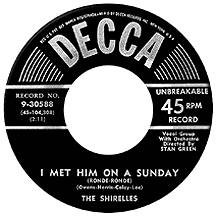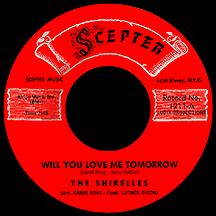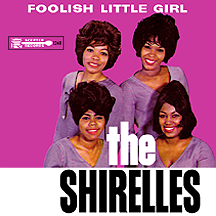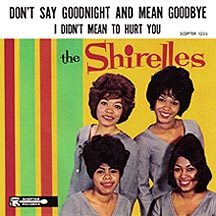THE SHIRELLES
There were these four girls at Passaic High School in New Jersey who sang pretty well together. Their talent was more obvious to classmate Mary Jane Greenberg that it was, perhaps, to themselves. Fortunately Mary Jane's mother, Florence Greenberg, had been thinking about getting into the record business, if for nothing else than to break up the monotony of being a housewife. She just wasn't sure how to follow through on the idea. When her daughter came home raving about the girls' performance at a school talent show, Florence was interested in seeing just how good these teenage singers were. Shirley Owens, Addie "Micki" Harris, Doris Coley and Beverly Lee had been calling themselves The Poquellos. When they sang for Florence, she wanted to make a record with them; but that name was just too strange! They would have to change it to something that sounded more appealing...and commercial.
A number of R&B girl groups had found success in the mid-to-late 1950s, among them Shirley Gunter and the Queens, The Hearts, The Teen Queens, The Bobbettes and in particular The Chantels, featuring Arlene Smith's strong lead vocals, riding high in early 1958 with their second hit, "Maybe." The four Passaic girls were a little intimidated by the prospect of getting into show business, but the chance to be like their idols overcame any hesitancy. In an imitative move, they changed the group's name to The Shirelles by mixing Shirley with Chantels. Florence, determined to break into the biz herself and get these girls a hit song, started going to the New York City hangouts where the music people were. The Turf was a restaurant at 1650 Broadway, a building where Hill and Range and other music publishing firms had their offices. A who's who of songwriters, producers and music execs would have lunch or after hours drinks there, and you'd figure a 40-something Jersey housewife would go unnoticed, but Flo was passionate about contemporary music and fit right in. She found a couple of backers and started Tiara Records, primarily for the purpose of releasing a Shirelles single.
"I Met Him on a Sunday" had already been performed by the group at one of those high school shows. The four had written it together and the simplicity of the lyrics exposed its amateur origin: 'Well I met him on a Sunday, and I missed him on Monday...' the alternating lead vocals punctuated by 'doo ron de ronde ronde papa doo ron...,' which has since become a classic of rock and roll nonsense lyrics. The big finish was '...and I kissed him on Thursday...and he didn't come Friday...when he showed up Saturday, I said bye-bye baby' and the relationship was over in less than a week! Flo Greenberg hit the road those first couple of months in '58 to promote the record herself and found surprisingly little resistance, though she quickly became overwhelmed by the amount of work. Approached by Decca Records with an offer to buy the rights to the group for four thousand dollars, she gave in. In April, while the Chantels' "Maybe" was still on the national charts, the Shirelles appeared with their 'ronde-ronde' song, hitting the top 50 within a couple of weeks. A middle-aged white housewife with her own short-lived record company had mentored four black teenagers...and they scored a hit on the first attempt!
Tiara Records was an experiment that had shown promise, so Florence started a new independent company with the money she'd gotten from Decca. Staying with a consistent theme of naming her record labels after a queen's possessions, Scepter Records was formed. A step up from Tiara, it was nevertheless a very small operation. She rented a two-room space at 1674 Broadway, simply a reception area with a door leading into her office. After a couple of releases distributed by Gone Records (including a promising but non-hit doo wop single by Eddie and the Starlites), she realized it would be difficult to recapture what she'd had with the Shirelles. But it's an example of failure sometimes being a good thing: unable to repeat the success of the first single with either of two follow-ups, Decca dropped the group, essentially throwing them right back in Flo's lap. Greenberg figured the big company just hadn't known how to properly market the girls, while she had the passion and detemination to get them another hit record. These were her girls, after all, and she wasn't going to let them out of her sight again.
The "5" Royales, an incredibly tight R&B group with a run of huge hits for the Apollo label in 1953 and '54, had signed with King Records during that second year, then found the going more difficult. The Shirelles were fans of the Royales, whose brilliant "Dedicated to the One I Love" had failed to hit on its first release in early 1958. The girls gave it a shot, with Doris's opening "This is dedicated..." leading into a group vocal with alternating solo lines for each girl, much like they'd done on the first single. Everyone involved felt the song would be a hit, but it stalled on the lower end of the charts in August '59. Area disc jockeys "Jocko" Henderson, Murray the K and Alan Freed were early supporters of the girls, giving them a great deal of airplay in New York and New Jersey. But Florence was going to need some help to strengthen the group, and the label, on a national level.
Luther Dixon, a former singer with The Four Buddies, had a solid track record as a producer and songwriter, penning hits in the last few years of the '50s for Pat Boone ("Why Baby Why" in collaboration with Buddies leader Leon Harrison), Perry Como, Nat "King" Cole and even Elvis ("Doncha' Think it's Time" with Clyde Otis). Fresh off his biggest hit yet, "16 Candles" (written with Allyson R. Khent), a number two hit in 1959 for The Crests, he was approached by Florence to work his magic with the Shirelles. He and Shirley Owens wrote "Tonight's the Night," and he had Shirley sing lead; her yearning vocal quality was a winner and would be utilized more in the coming months. Despite competition from a near-carbon-copy version by The Chiffons (a group from Los Angeles that predated New York's "He's So Fine" Chiffons by a couple of years), the song became the Shirelles' first top 40 hit.
Greenberg was very busy in 1960. After Dixon arrived she expanded operations, moving into a bigger office at 1650 Broadway (with the Turf conveniently downstairs) and starting a second label in the hopes of increasing her chances of doubling the potential amount of airplay. Dixon was given more control over the new imprint, Wand Records; Chuck Jackson was signed and went top 40 right off the bat with "I Don't Want to Cry" in early 1961. Besides all the hustle and bustle, Flo often took to the road with the Shirelles, who'd been booked as an opening act on a number of big shows. She and the girls would stay at the YWCA in various cities to cut costs. But these lean times were about to end.
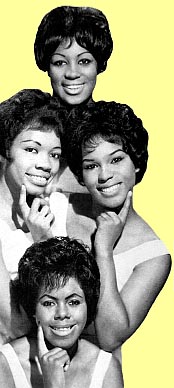
Newlyweds Carole King and Gerry Goffin were writing songs together and working for Aldon Music publishers, also located at 1650 Broadway. "Will You Love Me Tomorrow," with its thinly-veiled "I'll make love to you tonight but will you respect me in the morning?" message, got the Shirelles treatment, highlighted by Shirley's innocently-delivered, radio-friendly lead vocal. Dixon produced and 18-year-old Carole arranged the track, its string section calculated to tug at the heart. Released near the end of the year, the song went all the way to number one in February 1961, a first for the Shirelles, a first for an R&B girl group, a first for Goffin and King, for Dixon, and for Scepter Records (now regarded as a classic, it seems to get stronger as time passes). The group was suddenly so hot and in demand that Florence rereleased "Dedicated to the One I Love," as she had always felt it had major hit potential. At the end of February, both songs were in the top ten at the same time. The floodgates had opened for girl groups; by year's end The Marvelettes had a number one hit ("Please Mr. Postman") and The Paris Sisters, The Crystals, The Ikettes, The Orlons and King's own group The Cookies all had major hit singles over the next year or so.
Dixon and Willie Denson wrote the next A-side, "Mama Said," the group's third consecutive top ten hit. Teenage girls in particular were drawn to their impassioned but sweetly-delivered dissertations on adolescent love, a theme that would serve them well for the next few years. After that came a minor two-sided hit, "A Thing of the Past" (written by Bob Brass and Irwin Levine) backed with another King-Goffin tune, "What a Sweet Thing That Was." They made marriage demands (gently, of course) in "Big John," a top 40 hit at the end of year, then it was Burt Bacharach's turn to give it a whirl. Already an accomplished songwriter with hit songs dating back to 1958 with Como's "Magic Moments" and "The Blob" by The Five Blobs, his career would take a sharp upward turn with the discovery of Dionne Warwick in 1962, a future Scepter star (and occasional fill-in singer for the Shirelles on tour if any member should fall ill). With Mack David and Barney Williams (a pseudonym for Luther Dixon) he wrote "Baby It's You," a top ten hit in early '62. The Shirelles had established themselves as the biggest of all girl groups, far outpacing The Chantels, who'd so greatly inspired them. They would continue to lead the charge until a certain Motown threesome made an even stronger impact in 1964.
Florence frequently threw her own ideas into the songwriting mix that was constantly taking place in the Scepter-Wand offices. Occasionally she would write a song of her own (using the name Florence Green); a little thing she called "I'll Be True to You" wound up sending the group back to number one. The loyalty alluded to in the lyrics seemed incomplete, until Dixon came up with the title, "Soldier Boy," after hearing the line '...take my love with you, to any port or foreign shore...' A change of pace for the group, this seemingly-from-another-era smash was arranged with all four in a chorus throughout. The record's flip, "Love is a Swingin' Thing," featuring sax work by King Curtis (who'd punched up many a Coasters classic), was swingin' indeed. Other 1962 singles included Dixon's "Welcome Home Baby," Denson and Van McCoy's "Stop the Music" and an odd choice, a remake of "Everybody Loves a Lover" (curiously adapting the 1958 Doris Day hit using the arrangement of Barbara George's "I Know"), which cruised to the top 20.
Dixon left Scepter in 1963 and Stan Green (Florence's son Stanley, who'd produced the first single for Tiara) once again handled producing duties. His first endeavor was "Foolish Little Girl" (a Helen Miller-Howard Greenfield song), a warning to any woman fickle enough to let a man slip though her fingers ('But I love him'...'No you don't, it's just your pride that's hurt'...'I still love him'...'If you got him back again you'd go right out and do him dirt!'). It was a top ten hit in May 1963. The inevitable journey down that declining road came afterward; the next single, "Don't Say Goodnight and Mean Goodbye," was the quartet's last record to crack the top 40. The star-studded film extravaganza "It's a Mad, Mad, Mad, Mad World" hit theaters in the fall and the group recorded the theme song (with lyrics in several languages), backed with "31 Flavors," also from the movie. A peculiar career move, it did little, if anything, to keep them ahead of the competition.
By 1964, that competition was daunting. The Chiffons, The Ronettes, Martha and the Vandellas, The Dixie Cups and The Shangri-Las were grabbing most of the girl group attention. Then, of course, there were The Supremes, who would leave them all in the rear-view mirror, in addition to an even bigger menace from Britain's shores. But those U.K. groups, it turns out, had a lot of love for the Shirelles: The Beatles did "Baby It's You" and, with Ringo Starr singing, a rockin' version of "Boys" (the Luther Dixon-Wes Farrell flip side of "Will You Love Me Tomorrow"). "Sha-La-La," which had been a minor chart entry for the girls in early '64 was a much bigger hit for Manfred Mann at year's end. Even The Yardbirds took a little-known album track, "Putty (In Your Hands)," and amped it up for inclusion on their 1965 debut album.
In the mid-'60s, Shirley and Doris took time off to marry and raise families, while the group released records at a slower pace until their contract with Scepter was fulfilled. In 1967, the low-charting "Last Minute Miracle" placed them on the charts for the final time. Doris Coley left the group around 1968 (but joined up again later) and the remaining three soldiered on, waxing sides for the Blue Rock and Bell labels, followed by United Artists and RCA Victor in the 1970s. Shirley, with the most recognizable voice of the four, began recording solo in the mid-'70s using her married name Shirley Alston. Addie Harris sang with the group until she died of a heart attack in 1982 at the age of 42.
Beverly Lee stayed with The Shirelles the longest, eventually securing the rights to the name and touring with a new group of backing singers, though Shirley has been known to reunite for an occasional show. And as for that housewife with the passionate ear for music, Florence Greenberg kept Scepter going until 1976, piling up many hits along the way by the likes of Warwick, Jackson, Maxine Brown, The Kingsmen, B.J. Thomas and others. But she could not have built her empire without her teenage daughter Mary Jane's keen scouting abilities and those four gifted girls from Passaic High School.
NOTABLE SINGLES:
- I Met Him on a Sunday (Ronde-Ronde) - 1958
- Dedicated to the One I Love - 1959
- Tonight's the Night - 1960
- Will You Love Me Tomorrow /
Boys - 1961 - Mama Said - 1961
- A Thing of the Past /
What a Sweet Thing That Was - 1961 - Big John - 1961
- Baby It's You /
The Things I Want to Hear (Pretty Words) - 1962 - Soldier Boy /
Love is a Swingin' Thing - 1962 - Welcome Home Baby /
Mama, Here Comes the Bride - 1962 - Stop the Music /
It's Love That Really Counts - 1962 - Everybody Loves a Lover - 1962
- Foolish Little Girl /
Not For All the Money in the World - 1963 - Don't Say Goodnight and Mean Goodbye - 1963
- What Does a Girl Do? - 1963
- It's a Mad, Mad, Mad, Mad World /
31 Flavors - 1963 - Tonight You're Gonna Fall in Love With Me - 1964
- Sha-La-La - 1964
- Thank You Baby - 1964
- Maybe Tonight /
Lost Love - 1964 - Are You Still My Baby - 1965
- Don't Go Home (My Little Darlin') - 1967
- Last Minute Miracle - 1967


